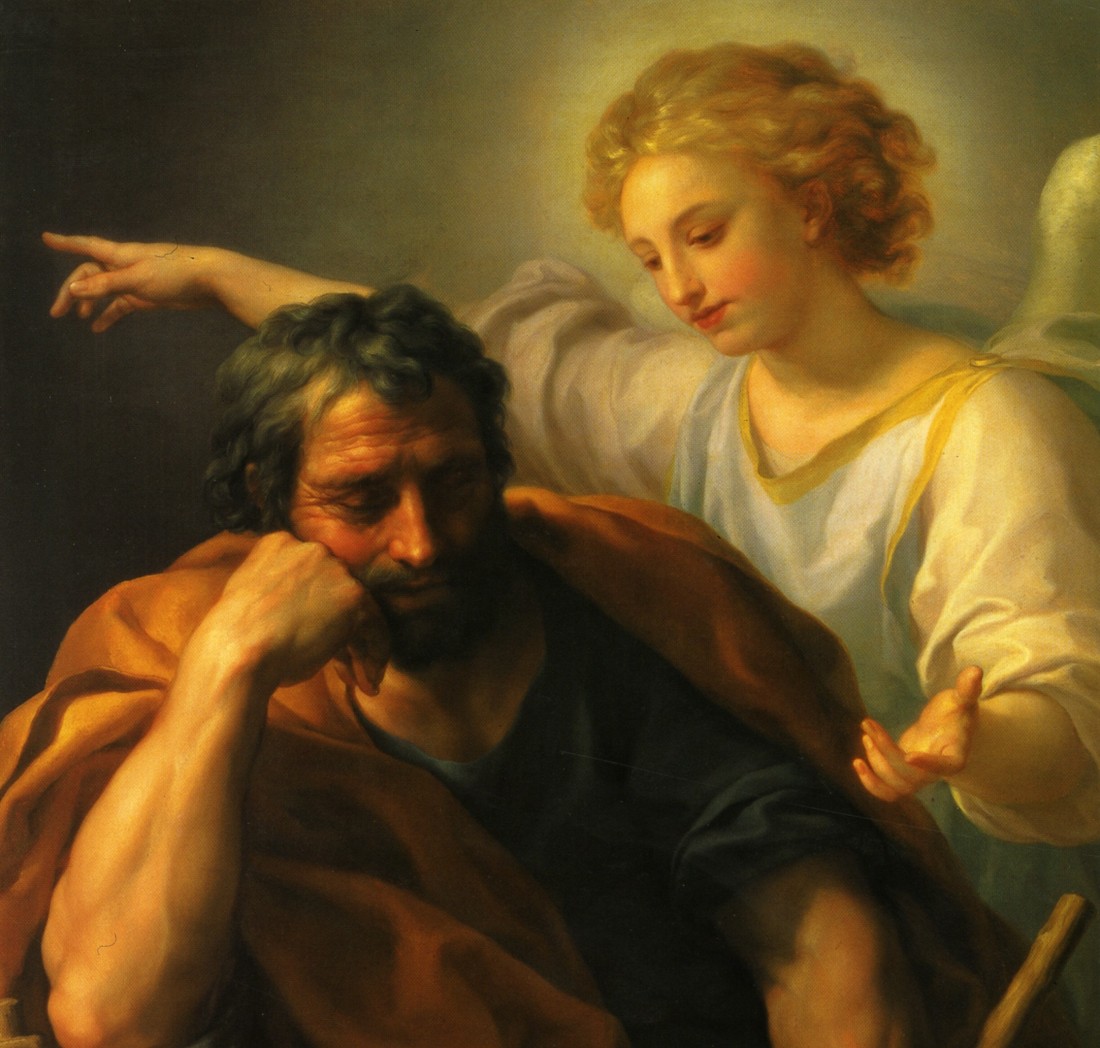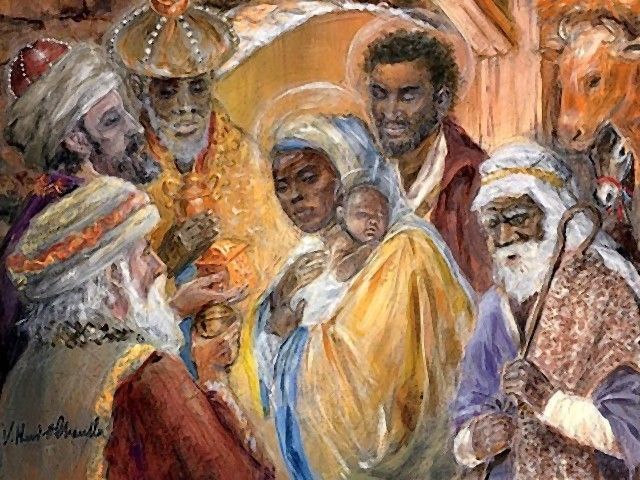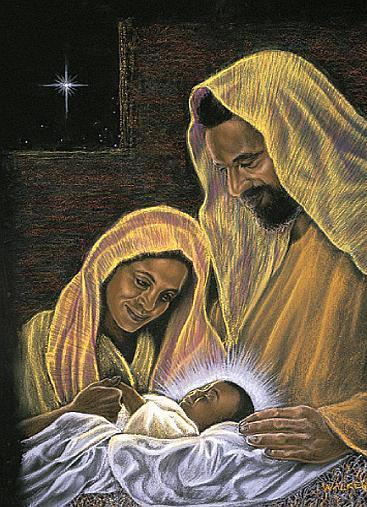a sermon for the Fourth Sunday of Advent [Year A]
Matthew 1:18-25
The congregation where I served as youth director during most of my years in seminary had a live nativity scene that was very popular in the community but even more popular within the congregation because of the ways it drew them together every year. It was a really well-done production, held outdoors so that people could easily gather underneath the star-lit South Carolina sky and watch it from their cars, if they needed to. One of the men of the congregation had a great radio voice and they had made a cassette tape recording of him—yes, that was still back in the days of cassette tapes—reading various parts of the Scripture story and the different characters would walk out of the dark into the nativity scene at the appropriate time.

It was a well-loved event, and one of the things I learned about that live nativity is that there was an unwritten, unspoken wait list to play the part of Mary. The roles were never decided upon beforehand but everyone kind of knew each year who the next Mary was supposed to be. It was usually one of the high school seniors. One year, for a reason I was never entirely clear about, someone who must have been unaware of that unwritten wait list assigned a particularly eager young girl to play the part of Mary, but she was a seventh grader. And, boy, did that upset the whole system. There was an outcry because she was going to take the place of some other young woman who had waited years to be Mary. It all got sorted out eventually, but not before feelings were hurt and people talked through it.
In all my years, I’ve never heard of a similar wait list for the part of Joseph. I’m sure they’re out there. I’m sure there are some young guys who have their heart set on playing him, this silent, strong figure who stands by in the stable, For the most part, however, Joseph remains a guy somewhat in the shadows.
There are probably several reasons for that. One of them might be because we rarely hear from him. Unlike Mary, Joseph has no speaking parts. In the version of Jesus’ birth that is told in Luke’s gospel, Mary speaks quite a bit. She has a conversation with the angel Gabriel. She even sings a song when she goes to visit Elizabeth. Joseph never says a word. Even in the version of Jesus’ birth found in Matthew—this one we hear today, which is the lesser known one and, from my experience, almost never included when churches and youth groups do nativity scenes—Joseph doesn’t actually speak.

Perhaps Joseph’s relative background status is due to the fact he’s so silent, that he doesn’t display the reactions to Jesus’ birth that Mary does, but perhaps it’s because we never hear his story on Christmas Eve. Christmas Eve is for Mary and the manger and the swaddling clothes and the shepherds. This version of Jesus’ birth, which focuses more on Joseph’s predicament, is stuck on the fourth Sunday of Advent. It’s just not as well-known. It digs a little deeper with the complicated themes of the roles of women in ancient society and male-dominated power structures.
When the focus is on her, Mary comes across as a somewhat powerful figure. She upends the world’s expectations by bearing the Son of God as a baby into the world. She sings of the rich being sent away empty. Joseph’s situation seems to be more about how to handle his fiancée in the face of tricky social and religious obligations. His power is a bit more subtle—and it comes from the decision to change his mind, to listen to the angel in his dream and not to end their marriage arrangement discreetly, since death by stoning is what the law would have called for in this type of scenario.
And that may be the key to what we can learn from Joseph, as quiet as he is. Whereas Mary demonstrates faith by doing precisely what the angel asks of her, letting God take up residence in her own body for a while and bringing him into the world, Joseph exhibits faith by not doing what was by almost all accounts considered the faithful and righteous thing to do.

Mary steps up and delivers. Joseph moves aside and changes plans against what would have been enormous pressure just to stay the course. With Mary comes the promise that even the lowly, not the mighty, can bear God’s presence among us. You and I, even in our moments of vulnerability and weakness (especially in our moments of vulnerability and weakness!) can be a vessel of for God’s Word. With Joseph comes the understanding that God gives us a responsibility to nurture and foster the ways God is present in others.
Joseph shows the holiness of stepping to the side, of putting well-laid plans to rest, of even laying aside a desire to do what the law or what religion may tell us and observing how God is with us in new ways. For that is the always the challenge of a God who is going to be called Emmanuel. When God decides to be with us, which is what Emmanuel means in Hebrew, then God is going to be right in our face sometimes, right there where we’d least expect him, like in Joseph’s pregnant fiancée whose life and status hang in his hands. Or right there in the dreams and anxieties that keep us up at night, pushing us in a direction that feels uncomfortable. Or—might we even go so far to say—with us on a cross.
The church I served in Pittsburgh partnered with an inner-city Lutheran Church one year to resettle some refugees from Myanmar. We put them up in some apartments in the neighborhood of that other congregation, which was in Troy Hill. Some of the refugees happened to be of an ethnic Christian minority, and so the congregation was eager to invite them to worship with them, even though the refugees were not Lutheran and even though the refugees didn’t speak English and the church members didn’t speak Karen. The pastor and the church worked for days to prepare a Sunday School lesson that they thought the Burmese refugees could understand. They got some translators to help. They scrounged together some additional art supplies to do some hands-on activities. They were so ready to serve those refugees and teach them the Bible.
Then Sunday came and the refugees showed up, children of all ages and few adults. The pastor and teachers quickly noticed that none of them were wearing shoes. So even though they had spent so much time on their Sunday School lesson, they figured the right thing to do was just to use the Sunday School time to go get all the kids shoes. And that’s what they did. They moved the Scripture lesson aside and went shoe-shopping.

There may have been the urge to say, “No, let’s do this lesson first and then go find shoes. Or make the charity agency aware of their situation.” Joseph could have said, “No, let’s follow my original plan and let God deliver Jesus some other way, in some other family, perhaps.” That congregation decided they were dealing with Emmanuel that morning. Yes, God certainly would have been with them in the lessons and worship they were so prepared to give but they discerned God was even more visible in the needs of their new neighbors.
Struggling to figure out how God is present with us in any given circumstance may be the main task of faith, and Joseph shows us that. Right there at the beginning of Jesus’ life, God is going to change people’s plans, tweak our ideas of righteousness, surprise us with the places he’ll show up. Right there at the beginning of Jesus’ life, God reminds us that all of this ministry, all of the things God’s Spirit does in this world all of the activities of the church are never really ours. They fall to us to safeguard and nourish, to protect and shelter. And we find God really moves and acts and transforms when we take ourselves and our agendas out of the way.

I know some congregations can struggle with certain ministries and certain pet projects over time. We can get so identified with one particular way of serving or reaching out to the community or one particular task that we forget the ministry isn’t about us or about one set outcome we’ve envisioned. We need a wait list to be Joseph—to be ready to hand things over, to let the spotlight be on others, for when we do that, the spotlight will always be on Jesus. For Jesus is always going to find a way to be with us. Jesus is always going to find us, to work his way into our mess as well as our well-constructed plans and rescue us. You see, his name doesn’t just mean “God with us.” He is also named “He saves us.”
British poet Ursula Fanthorpe was a nurse and administrator in psychiatric hospitals in London in the twentieth century, and what she witnessed of their care and their healing became the subject of much of her writing. She went on to receive the Queen’s Gold Medal for poetry. She also wrote poems on her Christmas cards to her friends, and they were collected at one point in a book called Christmas Poems. One which she writes on Joseph manages to capture the struggle of his situation beautifully, finally gives him lines to say even though Scripture leaves him silent. Should you find yourself on wait list for Mary at some point, yearning to bear Christ’s light, may Joseph’s humble service remind you that God, Emmanuel, is already there with you.
I Am Joseph (by U.A. Fanthorpe)
I am Joseph, carpenter,
Of David’s kingly line,
I wanted an heir; discovered
My wife’s son wasn’t mine.
I am an obstinate lover,
Loved Mary for better or worse,
Wouldn’t stop loving when I found
Someone Else came first.
Mine was the likeness I hoped for
When the first-born man-child came.
But nothing of him was me. I couldn’t
Even choose his name.
I am Joseph, who wanted
To teach my own boy how to live.
My lesson for my foster son:
Endure. Love. Give.
Thanks be to God!
The Reverend Phillip W. Martin, Jr.

Love this.
LikeLike
“Joseph shows the holiness of stepping to the side, of putting well-laid plans to rest, of even laying aside a desire to do what the law or what religion may tell us and observing how God is with us in new ways.”
“Struggling to figure out how God is present with us in any given circumstance may be the main task of faith.”
“And we find God really moves and acts and transforms when we take ourselves and our agendas out of the way.”
All of this sermon will go with me, but most especially these wise words. Thank you.
LikeLike
Thank you, so much for reading!!! Still think about those wonderful Pilgrim days. And your mom…your faithful, faithful mom!
LikeLike